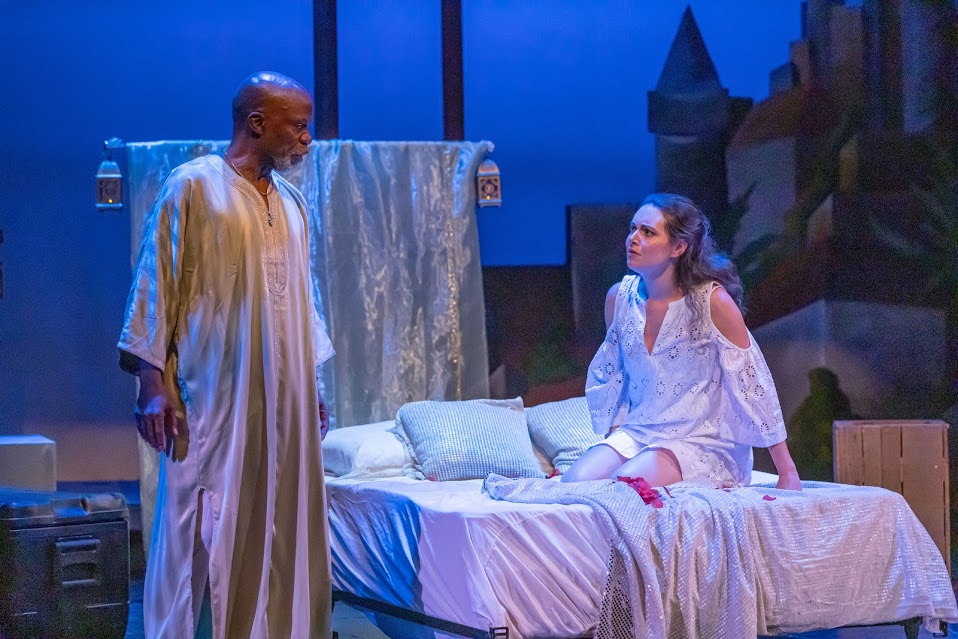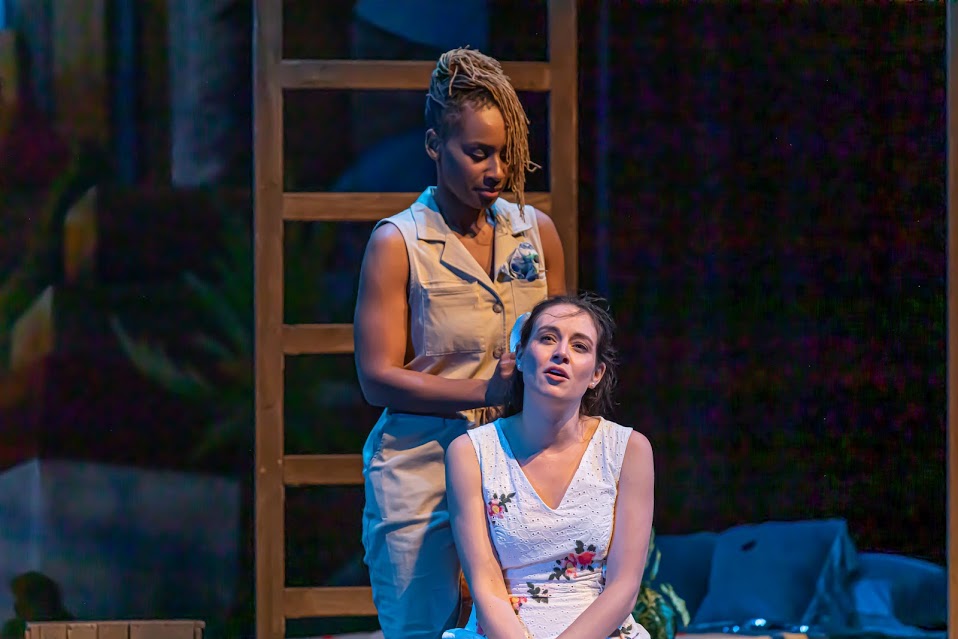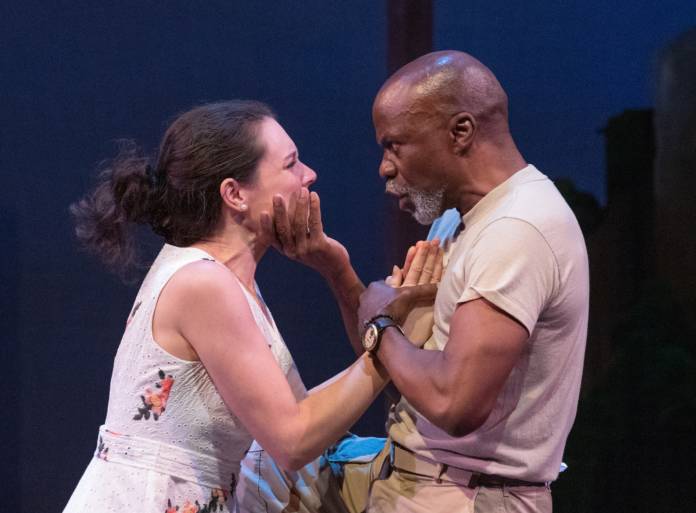“Oh, beware, my lord of jealousy! It is the Green-eyed monster which will mock the meat it feeds on!” Iago’s chilling warning to Othello has come to epitomize this Shakespeare tragedy. “Green-eyed monster” is the metaphor for jealousy that has endured for centuries.
But there are other monsters lurking in this 400-year-old play. In the African American Shakespeare Company’s production (now playing at the Marines Memorial Theater through October 27), director Carl Jordan puts those other monsters—hatred based on race and religion, misogyny and violence against women—center stage.
And how they threaten, grasp and devour!
L. Peter Callender’s Othello is a force of nature, a brewing storm whose centrifugal force impacts all around him. As general of the Venetian Army, he strides authoritatively in business suits and crisp uniforms. But as he is undermined by his chief advisor Iago (Michael Ray Wisely), his identity as the Moor, as a Black Moor, looms large.

Even his trappings begin to change. While the soldiers he commands wear the sandy camouflage of the US military in the Middle East, Othello dons a pale blue Jalabiya. (The evocative costumes are by Keri Fitch.) In a pivotal scene, Othello puts his combat boots aside, rolls out a prayer rug and invokes Allah in a traditional Muslim plea.
The hateful racial insults cut deeply. As they are whispered or shouted, the response of the audience is almost palpable, perhaps because they are echoed by the anti-Muslim and racist language that spews from the mouths of white supremacists today. The soldiers, Iago chief among them, deride Othello, as “the Moor,” “an old black ram” and one with “the thick lips.”
Their crude racial slurs echo the catcalls of today’s street thugs. But the government officials join in this vitriol: Desdemona’s father Brabantio (Gene Thompson), a Senator, warns, “For if such actions [as inter-racial marriage] may have passage free, Bond-slaves and pagans shall our statesmen be.”
Sound familiar?
Help us save local journalism!
Every tax-deductible donation helps us grow to cover the issues that mean the most to our community. Become a 48 Hills Hero and support the only daily progressive news source in the Bay Area.
Likewise, misogyny is not just an undercurrent, but a dominant force in this production. And it is met with resistance by Desdemona (Isabel Siragusa) and Emilia (Champagne Hughes).
Callender (who is also the artistic director of the company) transforms from a besotted husband of the beautiful Desdemona and authoritative leader of a victorious army into a man torn apart by his own jealousy. Callender draws on every bone and sinew to portray his sorrow and anger upon learning that his beloved has betrayed him. His performance is both operatic and balletic, as if his body cannot contain his enormous grief.
The source of this knowledge, of course, is “the honest Iago,” who has revealed his own jealous motives from the very beginning, “I follow him to serve my turn upon him,” he tells the swaggering, callow Rodrigo (Gabriel Ross). Not only is he resentful that “the Moor” is his commander, but to add insult to injury, the black-skinned general has passed him over for promotion, giving the post of lieutenant to young Cassio (Ariel Sandino). Iago plots an elaborate scheme to fool his general into thinking that Desdemona has been unfaithful to him with the handsome Cassio.

Wisely’s Iago is calculating but understated, no moustache twisting here. Competing with the white-hot fury and despair of Callender’s Othello would have been impossible, so director Jordan effectively sets the pair up in a syncopated contrast that defines them both more sharply. Iago seems to be in perfect control as he schemes with Rodrigo, conceals his glee as he tricks his wife Emilia into giving him Desdemona’s telltale handkerchief, and manipulates Cassio into an elaborate set-up that leads to his murder.
But as he predicted for Othello, his jealousy is his own undoing.
Siragusa makes the delicate transformation from a flighty, infatuated young Desdemona, giddy with love, adventure, and daughterly defiance into a woman mystified, saddened, and eventually despondent at her husband’s jealous rage. Siragusa gains confidence and presence as she delves into the more difficult emotions of the later acts.
As Emilia, Hughes is the actor who took my breath away. Her slow realization of Iago’s trickery and its deadly consequences is paced exactly right as her awareness and her fury seethe to the surface. Hughes’ facial expressions reveal each painful step of her reckoning.

Her speech at the end of Act IV—lambasting male domination of women—is a showstopper. “Let husbands know, their wives have sense like them: they see, and smell, and have their palates for sweet and sour, as husbands have. What is it that they do when they change us for others? Is it sport? I think it is:…And have we not Desires for sport as men have? Then let them use us well: else, let them know, the ills we do, their ills instruct us to.”
The words could have been written by a 21st century feminist, but they were from the pen of male playwright in 1603. The speech seemed so contemporary that I had to go back to my complete works of Shakespeare to look it up. There it was. Hughes’ delivery was so poignant and heartfelt that it transformed the scene into a into a fierce woman’s call to arms.
The high drama is punctuated with breathtaking, acrobatic fight scenes, choreographed by Durand Garcia (who also does a brief turn on stage as Gratiano, Desdemona’s uncle). Out of nowhere actors seem to pull out swords and knives and other weapons to do harm—sometimes to themselves.
The African American Shakespeare Company has brought to life Shakespeare’s monsters—green-eyed and otherwise—and recreated a drama that will leave contemporary audiences profoundly shaken.
OTHELLO
Through October 27
Marines Memorial Theater, SF
Tickets and more info here.





